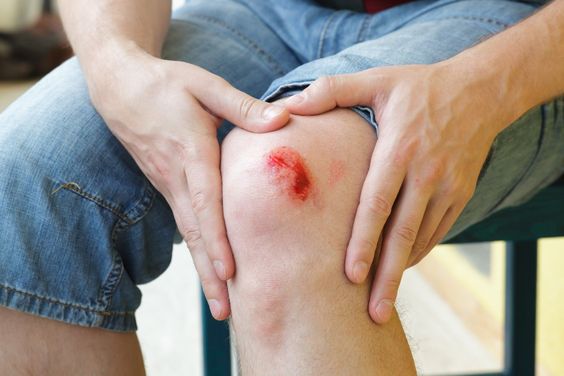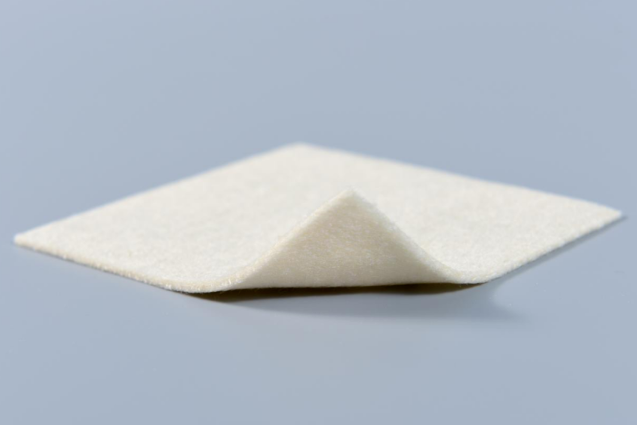With the in-depth study of the pathophysiology of wound healing, people have a deeper understanding of the wound-healing process, which has led to the continuous improvement and development of dressings. At present, alginate dressings are one of the most commonly used medical dressings in the world. The following is a detailed introduction to alginate dressings.

What are alginate dressings?
Alginate dressing is a soft non-woven fiber dressing extracted from seaweed. Its main components include 85% natural alginate fiber and 15% sodium carboxymethyl cellulose. Alginate dressing is highly hydrophilic and can convert insoluble calcium alginate into soluble sodium alginate through an ion exchange reaction after contact with wound exudate while releasing calcium ions. This process gives it a hemostatic function. Alginate dressing has excellent absorption performance and can absorb exudate equivalent to 20 times its own weight, which is 5 to 7 times that of traditional gauze. After absorbing the liquid, the dressing swells to form sodium alginate gel, forming a soft, moist, gel-like semi-solid substance on the wound surface, providing a closed atmospheric oxygen-free environment for the wound, accelerating the proliferation of new microvessels, and is of great significance for maintaining a moist environment, improving the regeneration ability of epidermal cells, accelerating the movement of epidermal cells, and promoting wound healing.
Clinical Application:
1. Lower limb ulcer wounds: Alginate dressing products are particularly suitable for the care of lower limb ulcer wounds, and are generally used in direct contact with the wound surface. In clinical applications, alginate dressings can be fixed on the wound with a pressure bandage.
Diabetic foot ulcer wounds: The high hygroscopicity and low adhesion of alginate dressings make them very suitable for the treatment of diabetic foot wounds.
2. Bedsores: Bedsores usually have a lot of pus discharge, and in severe cases, a hole will form on the wound. Due to its good hygroscopicity, alginate dressings are particularly suitable for the care of bedsores. Filling alginate dressings are used to fill severely decayed hole-type wounds, and the treatment effect is outstanding.
3. Surgical wounds: Alginate dressings have good hemostatic properties and can form colloids on wounds to reduce the pain of patients. They are especially suitable for the care of nasal surgery. Alginate dressings have good hemostatic effects, less bleeding during packing and removal, less pain, and less edema of the nasal mucosa after surgery.
4. Skin donor sites: various cavities, sinus wounds, cavity sinus, and post-endodontic wounds.
What are the advantages of alginate dressings?
Strong liquid absorption ability, maintaining a moist healing environment
It has a high adsorption capacity and can absorb exudate equivalent to 10-20 times its own weight to maintain a moist healing environment on the wound surface.
Derived from nature, safe and non-toxic
Alginate is a natural polysaccharide carbohydrate extracted from seaweed. It is a natural polymer material that is non-toxic to the human body and can be used safely.
Easy dressing change, reducing local pain
The hydrogel formed on the surface effectively protects nerves and avoids external stimulation; it is not easy to adhere to the wound, is easy to remove, and reduces wound pain.
Good compliance and easy-to-pack
It is suitable for filling wounds, filling wound surfaces, promoting the growth of cavities, and is soft and fit, with better effects.

Indications and Usage:
Alginate dressings are suitable for the treatment of a variety of exudative wounds, including the filling of sinus tracts, undermining, and cavity wounds. They can create a good moist environment, enhance autolytic debridement, and promote granulation growth. Alginate dressings containing silver ions can also effectively resist infection. When using, dry alginate dressings should be covered on clean wounds and ensure good contact with the wound bed and any undermining areas.
Alginate dressing is an efficient and multifunctional wound care material. It provides patients with better care options by providing a moist healing environment, absorbing exudate, and promoting wound healing. With the development of medical technology, the application scope of alginate dressing will be further expanded, bringing good news to more patients.
For more information on Innomed® Alginate Dressing, Refer to the Previous Articles. If you have customized needs, you are welcome to contact us; You Wholeheartedly. At longterm medical, we transform this data by Innovating and Developing Products that Make Life easier for those who need loving care.
Editor: kiki Jia

 English
English عربى
عربى Español
Español русский
русский 中文简体
中文简体








